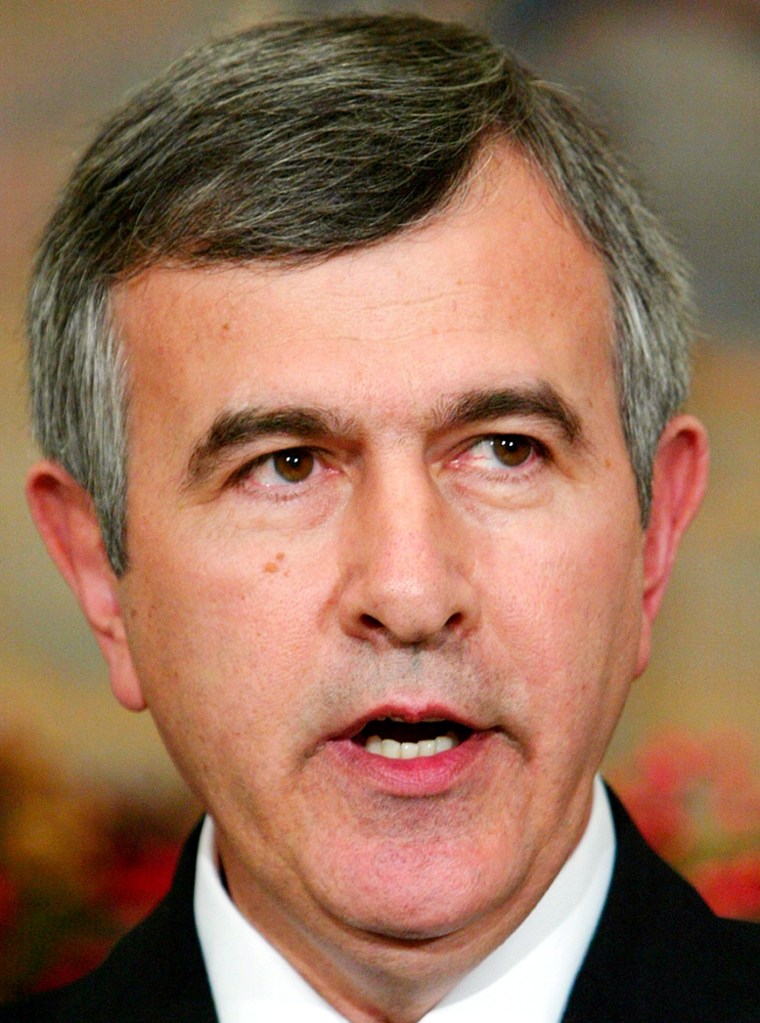A majority of the members of the Senate Agriculture Committee on Thursday approved the nomination of Nebraska Gov. Mike Johanns as U.S. agriculture secretary, virtually guaranteeing the full Senate will confirm him.
Johanns is first of President Bush's second-term nominees to clear a Senate committee. He is nominated to succeed Ann Veneman and become the nation's 28th secretary of agriculture.
Johanns will resign as governor upon confirmation.
Eleven of the 20 senators present voted to approve the nomination. Because the panel originally planned to vote later, the roll call was held open to allow the rest to vote.
Reconsideration of border decision urged
During the hearing, senate Democrats asked Johanns to reconsider the Bush administration's decision last week to open U.S. borders to Canadian cattle despite a fresh case of mad cow disease in Alberta.
"I am far from convinced that Canada is effectively enforcing its own regulations," Sen. Kent Conrad, D-N.D., told Johanns.
Johanns promised the panel he would adhere to the values he learned growing up on an Iowa dairy farm. "I will always be a farmer's son with an intense passion for agriculture," he said.
The agriculture job is "one of the most significant positions in government, and one of the most unheralded," Iowa Sen. Tom Harkin, the committee's senior Democrat, told Johanns.
As Nebraska's governor, Johanns helped develop recommendations from Western and Midwestern states that became part of the 2002 farm law, and he advocated for a system that would warn farmers earlier and prepare them better for drought. He also developed a bill of rights for workers in the meatpacking industry.
Republicans and Democrats alike expect swift approval of the nomination, but nonetheless they had tough questions for Johanns, especially about the reopening of borders to Canadian cattle.
"I told him to go slow because I don't believe we know enough about the safety of Canada's beef supply to open the border up again," Sen. Max Baucus, D-Mont., said after meeting Tuesday with Johanns. "The risks are just too great. I'm suggesting to the administration that we slow this process down and use only sound science as a guide, not politics on one side of the border or the other."
Second mad cow case in Canada confirmed
Canada confirmed the discovery of a second case of mad cow disease on Sunday, days after the United States said it would lift a ban on Canadian beef. Shipments of Canadian cattle were halted in May 2003 after the discovery of the first case.
Republican Sen. Pat Roberts of Kansas is concerned about persuading other countries, Japan in particular, to reopen their borders to U.S. beef.
"One of the questions that I think farmers are asking is, 'Why are we reopening our borders to Canada when we can't ship to Japan yet?"' Roberts said. "… Reopening the market to Japan is absolutely crucial to us."
Many countries banned U.S. beef a year ago, after a dairy cow in Washington state tested positive for bovine spongiform encephalopathy, or BSE, commonly called mad cow disease. People who eat tainted meat can contract a fatal brain disease, variant Creutzfeldt-Jakob disease.
U.S. beef exports are expected to grow by 35 percent this year, but that's still significantly below historical levels, according to the Agriculture Department.
In private sessions before Thursday’s hearing, senators also pressed Johanns on food security, country-of-origin labeling, protecting agriculture from budget cuts and promoting ethanol and biodiesel fuels.
"I am eager to follow up and learn more about the topics you've raised in our meetings, such as managing our forest lands, food assistance programs, protecting plant and animal health, ensuring the safety of our food and making certain the USDA serves all customers and treats all employees with equality, dignity and respect," Johanns told senators in his opening remarks.
